Editors note: A first person report by Gardy Charles, an employee of Schneps Media.
My fiancée and I flew into Montego Bay for a wedding, expecting sun, patties, and beach vibes. A hurricane named Melissa existed, but early reports said it would hit the east side, far from us on the west. Life felt normal: the airport was smooth, the Airbnb was perfect, the rental car was ready, and with internet, I could work, since I didn’t think of it as a vacation.
However, the weather apps on TV were largely useless, mostly featuring U.S. forecasts, and the only clear information came from a news clip showing flooding in Hispaniola. There was an information vacuum for outsiders. We had no idea what was coming since the first time we heard about Hurricane Melissa was at the resort meeting. So we turned to ChatGPT, which quickly became our real weather advisor.
The First Signs Something Was Wrong
By Friday night, everything still felt normal; locals were calm, Pier One was packed, and people were partying as usual. But ChatGPT was warning us: “This storm is slow and unpredictable. Stay alert.” Saturday morning, at the wedding, we received the news: Melissa had shifted west toward Montego Bay and strengthened to a Category 5. That’s when the island changed. Stores closed early.
Patty shops locked their doors. Supermarkets shut down. Street chatter shifted from weekend fun to fear of the storm. We stocked up wherever we could; with all supermarkets closed, we found two small local Chinese shops most tourists would never find and bought dried goods. ChatGPT guided us step-by-step through what to buy and how to prep.
[caption id="attachment_78679" align="aligncenter" width="700"]
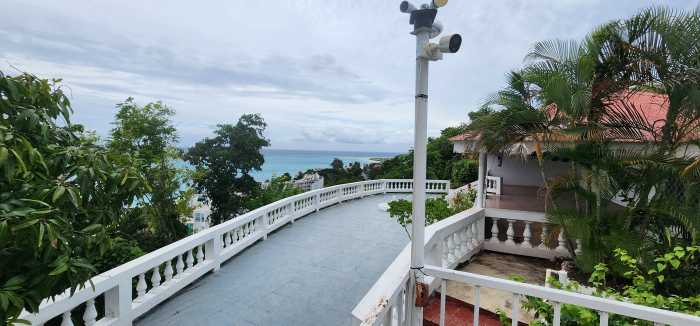 A top view of Montego Bay, Jamaica on Oct. 27, 2025. Photo by Gardy Charles
A top view of Montego Bay, Jamaica on Oct. 27, 2025. Photo by Gardy Charles[/caption]
The Resort vs. Airbnb Decision
Saturday night, we debated fleeing to a beachfront resort, assuming they’d be safer. But ChatGPT shut that down hard: “Do NOT go to waterfront resorts during a Category 5 hurricane. Storm surge and glass-heavy rooms are deadly. Your hilltop Airbnb is structurally safer.” We challenged it: “Wouldn’t the hill be windier?” ChatGPT responded: “Wind is better than water. Stay put.” That advice locked our decision. It ended up being the right one, especially after seeing on social media what happened to the folks who stayed at resorts.
The Island Braces
Sunday was strangely calm. We walked Hip Street, grabbed more supplies, cooked all our food, and prepped for a blackout because the Airbnb host said plumbing and electricity would absolutely fail. ChatGPT told us: “Assume days without power. Secure your doors, prepare lighting, charge everything.”
By late Sunday, JetBlue emailed: “Your Monday flight is canceled.” Now we were trapped. I continued working on Monday and informed my colleagues and managers of the situation. Their support was tremendous, and I’m genuinely grateful.
[caption id="attachment_78689" align="aligncenter" width="700"]
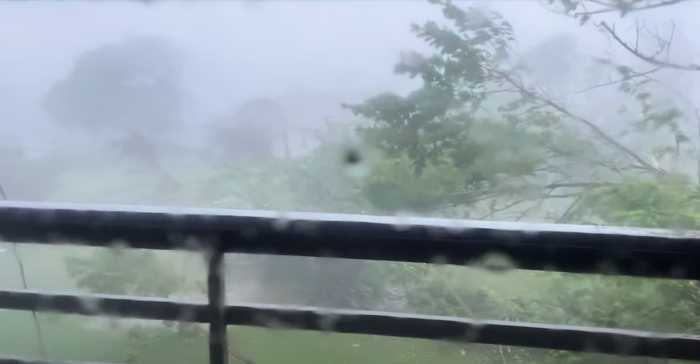 Hurricane Melissa struck Jamaica on Tuesday, Oct. 28, 2025 around 2 p.m. Photo by Gardy Charles
Hurricane Melissa struck Jamaica on Tuesday, Oct. 28, 2025 around 2 p.m. Photo by Gardy Charles[/caption]
Impact Day
Tuesday morning, rain hammered the building. Power cut. The internet vanished except for a weak cell signal. ChatGPT still gave guidance whenever the signal briefly returned: cover glass doors with sheets in case of shattering, push heavy furniture behind the entry door, stay away from windows, and identify the strongest interior room. We followed what we could. By noon, the hurricane unleashed itself, and it sounded terrifying. I had never heard wind like that before.
Wind Like a Jet Engine
The sound was unreal — roaring, whistling, vibrating our glass sliding door. Water poured under our entry door. The sliding glass door shook so violently that every gust felt like the moment it would explode. The roof leaked. Trees snapped in half, with whole branches flying past the balcony. Each gust felt like the entrance door would blow open.
To mentally escape the terror, we took multiple naps. But every wake-up was worse. At the peak, we watched palm trees stripped bare, roof pieces blowing away, a nearby pole bending, and debris spinning in the air.
ChatGPT reassured us about the sliding glass door: “Glass breaks mostly from debris impact. You’re surrounded by dense trees, not airborne objects. Stay away from the door, but it’s unlikely to blow.” That kept us calm enough to wait it out.
[caption id="attachment_78688" align="aligncenter" width="700"]
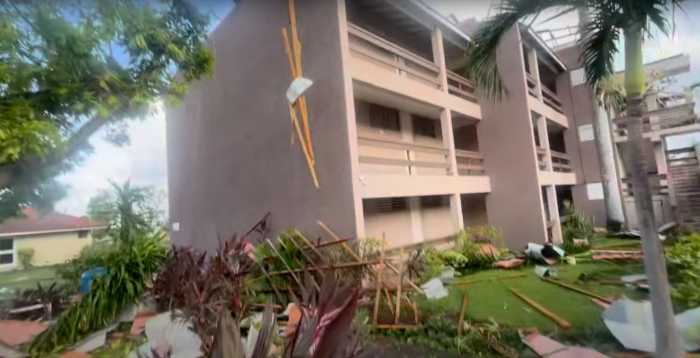 Debris strewn around our Airbnb after Hurricane Melissa struck. Photo by Gardy Charles
Debris strewn around our Airbnb after Hurricane Melissa struck. Photo by Gardy Charles[/caption]
[caption id="attachment_78690" align="aligncenter" width="524"]
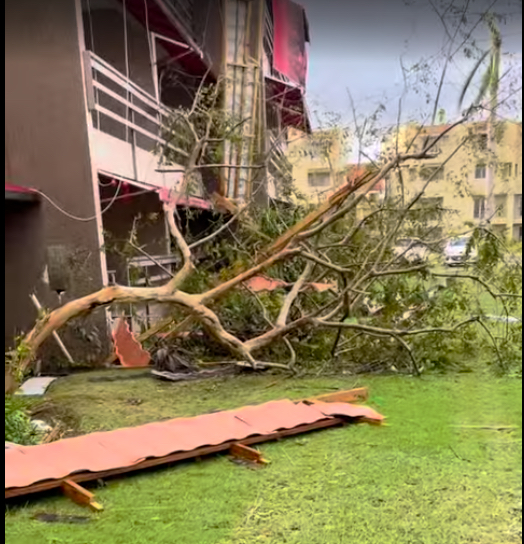 The roof of our structure flew off. Photo by Gardy Charles
The roof of our structure flew off. Photo by Gardy Charles[/caption]
[caption id="attachment_78684" align="aligncenter" width="700"]
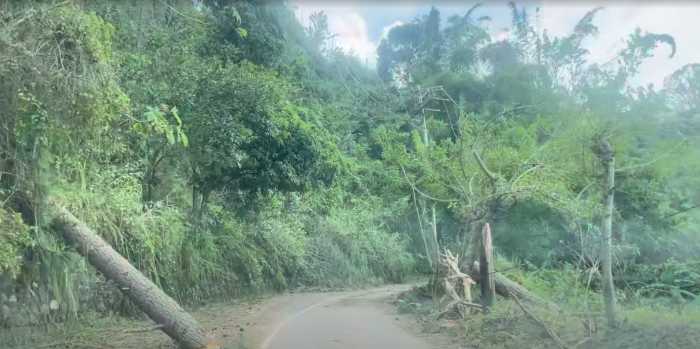 The weekend after the Hurricane Melissa in Jamaica.Photo by Gardy Charles
The weekend after the Hurricane Melissa in Jamaica.Photo by Gardy Charles[/caption]
The Aftermath
By evening, the roar faded. We stepped out and saw a different world: palm trees uprooted, the entire zinc roof ripped off the building and blown 100+ feet away, all vegetation behind the Airbnb destroyed, paint stripped from the back balcony, and blocks of debris everywhere.
Neighbors came out, sharing their survival stories: a tourist who sheltered behind her mattress, a woman who held her bathroom door shut with her feet for hours, residents whose apartments flooded, and a security guard who didn’t know if his family had survived yet.
Driving around was surreal: houses with roofs missing, the A1 Highway blocked by massive trees, people using oncoming lanes because the other side was destroyed, a large boat sitting in the middle of the road, crowds gathered anywhere a faint cell signal existed, and empty resorts with locals climbing the walls just to get Wi-Fi.
[caption id="attachment_78685" align="aligncenter" width="700"]
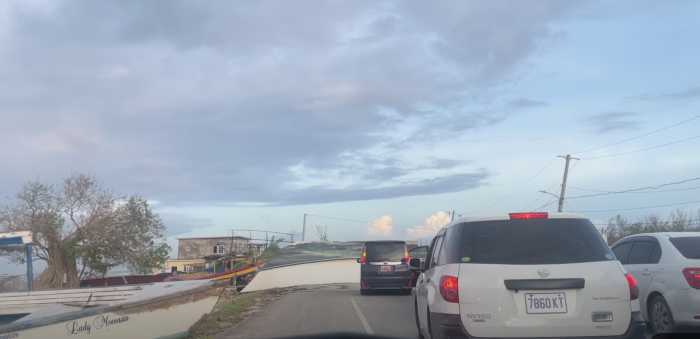 A big boat on the highway after the passage of Hurricane Melissa in Jamaica. Photo by Gardy Charles
A big boat on the highway after the passage of Hurricane Melissa in Jamaica. Photo by Gardy Charles[/caption]
Exodus to Kingston
With our flight canceled and MoBay devastated, we drove to Kingston based on a report from someone who had come from Kingston to check on their Airbnb. Using Google Maps offline, we decided to leave for Kingston around 4 p.m. After driving for three hours in total darkness with only the headlights on, navigating unfamiliar roads that avoided fallen trees, boats, road closures, and landslides, we finally saw some lights on the horizon. Kingston was near. Shockingly, it looked untouched; life was almost normal, with only minor outages in some Airbnbs. We pulled over, found a place to stay, and remained there until the airports reopened. We flew out seven days later.
Jamaica remains one of my favorite vacation destinations. The strength of the people is unmatched — cleaning, rebuilding, and helping each other immediately. This disaster reminded us that hurricanes hit unpredictably, locals don’t always have the resources to rebuild, and survival often depends on acting fast, staying calm, and getting the right information at the right time.
Melissa was natural, not man-made, and the Caribbean deserves support, not judgment, for living in a region where storms are a common occurrence.

 A top view of Montego Bay, Jamaica on Oct. 27, 2025. Photo by Gardy Charles[/caption]
A top view of Montego Bay, Jamaica on Oct. 27, 2025. Photo by Gardy Charles[/caption]
 Hurricane Melissa struck Jamaica on Tuesday, Oct. 28, 2025 around 2 p.m. Photo by Gardy Charles[/caption]
Hurricane Melissa struck Jamaica on Tuesday, Oct. 28, 2025 around 2 p.m. Photo by Gardy Charles[/caption]
 Debris strewn around our Airbnb after Hurricane Melissa struck. Photo by Gardy Charles[/caption]
[caption id="attachment_78690" align="aligncenter" width="524"]
Debris strewn around our Airbnb after Hurricane Melissa struck. Photo by Gardy Charles[/caption]
[caption id="attachment_78690" align="aligncenter" width="524"] The roof of our structure flew off. Photo by Gardy Charles[/caption]
[caption id="attachment_78684" align="aligncenter" width="700"]
The roof of our structure flew off. Photo by Gardy Charles[/caption]
[caption id="attachment_78684" align="aligncenter" width="700"] The weekend after the Hurricane Melissa in Jamaica.Photo by Gardy Charles[/caption]
The weekend after the Hurricane Melissa in Jamaica.Photo by Gardy Charles[/caption]
 A big boat on the highway after the passage of Hurricane Melissa in Jamaica. Photo by Gardy Charles[/caption]
A big boat on the highway after the passage of Hurricane Melissa in Jamaica. Photo by Gardy Charles[/caption]

 Mark
Mark 





